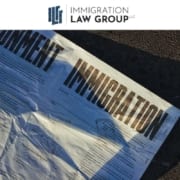Since the Trump Administration published new proclamations restricting certain immigrants from entering the U.S. on April 22nd, further proclamations have been expected to be added to restrict the entry of nonimmigrant visa holders. On June 5th, 2020, the Whitehouse, the Department of Labor, and the Department of Homeland Security have agreed to some changes that will restrict merit-based immigration into the United States. Thus far, no final version of the order has been published (only a draft of the order has been leaked). The final details of the ban will likely be announced on June 15th.
This new visa ban will impede the entry of nonimmigrants with temporary visas, particularly visas of categories J-1 (temporary work visa for students and trainees), L-1 (visa for high-level executives transferring to the U.S.), H-2B (temporary nonagricultural work visa used by many in the food processing industry), and H-1B (most common high-skill work visa). It is likely that the ban will also obstruct the initial obtainment of these visas by nonimmigrants, and that other temporary visas will also be impacted.
The Trump Administration also reported that it would target the Optional Practical Training (OPT) program, which offers recent graduates of U.S. institutions the opportunity to work in the U.S. for a short period of time (typically one year for students, or three years for STEM students) after graduating. This new restriction would only allow for students graduating at the top 5%-15% of their classes to have this opportunity.
A very devastating change created by this ban would be to include a new additional $20,000 filing fee for H-1B visas that would be added to the pre-existing filing fee. This would automatically deter many employers from staffing their agencies with foreign national workers. However, note that this change has not yet been made, and it is doubtful that this is even legally permissible.
These new visa ban efforts, drafted by Jared Kudlow and Jared Kushner, seem to be a continuation of President Trump’s executive order in April that limited the issuance of green cards to foreign nationals abroad on the basis that this was a crucial step to protect American jobs during the economic crisis catalyzed by the coronavirus pandemic. Many experts doubt the validity of this justification.
Additionally, the U.S. nonimmigrant visa ban will likely last between 90 to 180 days, but there are certain exemptions related to the coronavirus pandemic that will permit an alien to enter the United States. Such exemptions will be made for aliens who are healthcare professionals, food supply workers, or medical researchers working in fields related to COVID-19. However, these exemptions are only valid if American employees have enacted additional recruitment efforts to hire American workers to fill these positions.
It is also important to note that a 120-day ban will likely apply after October 1st, 2020, which is when the H-1B cap-based petitions of the autumn will be approved. The implications of this are that even if companies have passed the lottery and submitted successful H-1B petitions after October 1st, their workers may still be prevented from entering the U.S. under this ban.
Many actors, such as the U.S. Chamber of Commerce’s CEO Thomas Donohue, have written letters to President Trump or spoken publicly against such a new visa ban, warning against the negative economic effects. Overall, if this ban is implemented completely, the implied changes will impact the 5% of the American workforce that rely on nonimmigrant visas, along with the companies that hire these nonimmigrants. It has been recommended by some experts that if you are currently outside the U.S. and have a valid H-1B/H-4 or an L-1 or L-2 visa, you should consider returning to the U.S. as soon as possible.




